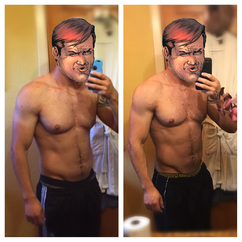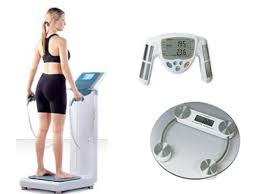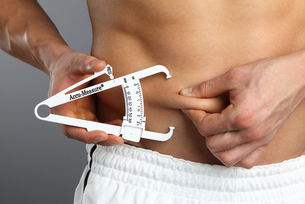|
As I mentioned in my previous article (‘Why Aren’t You Progressing'), one of the main reasons a person may not be progressing is due to their inadequate methods to gauge their progress in their fat-loss or muscle-gain endeavors. For the Scale Watchers: Most fitness enthusiasts simply go to the gym, step on whatever scale is available and either become overjoyed or disheartened, because they did (or didn’t) see the number they wanted to see. Solely watching the scale (at different times of the day) is really doing a disservice to yourself because:
How to Weigh Yourself Correctly: What I recommend is for an individual to weigh themselves every morning, upon waking, after using the bathroom and in the nude (or in undies, just be consistent). This will give them the best indication of their bodyweight. The reason I recommend this is because weight fluctuates day to day for various reasons (food content in stomach, hydration levels, water retention from salt intake or menstrual cycle) and simply just weighing yourself 1-3 times a week isn’t enough data to really asses what is going on. So by weighing-in everyday (upon waking) you can begin to asses what your trend of weight-loss (or weight-gain) looks like over time, because acute fluctuations are expected and will happen. Body Measurements: A lot of times the scale doesn’t tell the whole story when it comes to gaining muscle or losing fat. Say the scale isn’t moving but your measurements (such as waist, legs, thighs, arms & etc) are going down, then you are indeed losing body-fat. This would actually indicate that you are putting on small amounts of muscle along with losing fat! I would recommend you measure yourself in the morning, after weighing-in. Measure your arms, thighs, and waist, and make sure to record the data! You can take measurements once a week, since measurements don’t fluctuate as much as body-weight, just be consistent with the day you measure yourself. Progress Pictures: Weekly progress pictures definitely can show improvements on your physique when the scale isn’t budging. Just make sure to use the same location and lighting for accuracy purposes to compare past and present pictures. Try to take the pictures in the morning after your weigh-in, be consistent on the day you take your progress pictures as well (just like when you take your measurements). Just to give an idea of how progress pictures and measurements can tell a different story, below is a picture of myself. The photo on the left is from 7/23 & the photo on the right is from 12/5…Difference in weight? None, in both I weigh 188 lbs…Biggest difference is that my waist is 1.5 to 2 inches smaller in the picture on the right. Had I only been going by my scale weight and not taken measurements or weekly pictures, I would have thought that everything that I was doing was inadequate! Workout Journal: Keep a workout log and track your workouts! Record every set & rep. You should be getting stronger (completing more reps, increasing the weight, increasing sets or increasing the time under tension) every workout. The name of the game is progressive overload, so keep a ledger of how your workouts are progressing & assess what you liked, didn't like, and what could you try differently next time to improve. This something many people overlook. Not Recommended for Analyzing Progress: I don't like to measure a person’s body-fat percentage due to the inaccuracies with the most of the readily-available methods. Plus in the reality of it all, it is just a number…Either you are happy with your level of conditioning or not.
0 Comments
Typically when it comes to lack of results and progress, the individual in question is not putting their 100% effort into it or simply isn’t consistent. Countless of times I have run across people who claim they’ve tried everything under the sun and never see any results or progress. Well this is usually when I start asking them questions regarding workout frequency, consistency with nutrition, nutritional intake & how they are tracking progress.
From experience, it falls down to lack of consistency, dishonesty (or misdirection) with nutrition and inadequate ways to track their progress. One has to remember that there is no shortcut to reaching your goals (be it fat-loss or muscle-gain) it all takes time…Especially if you are working with me, we will do things in a controlled manner in order to not have to go to extreme measures (crash dieting). Consistency in Training Be it with your weigh training or cardio sessions, you have to be consistent with your program. If you find yourself always skipping a workout session or two every week, it may be a factor on why you aren’t are seeing the results you want. My suggestion for anyone in this predicament is to re-evaluate your program. Your options are to either re-commit to your program and push yourself to not skip any further workouts OR adjust your workout schedule to something more feasible (reduce the amount of workouts per week). In my personal experience, you may want to reduce the amount of workouts per week, not only will it make it easier for you to commit, but also there is the mental aspect of feeling accomplished when you complete all of the week’s workouts vs feeling defeated that you skipped a few workouts. Though with that said, if reducing your amount of workout days, you may have to make an adjustment to your nutritional intake (depending on your goals). Consistency in Nutrition This is the biggest game changer for most folks when it comes to reaching their fitness goals. I have run across many individuals that simply lack the consistency in hitting their nutritional goals and end up overeating most of the time that they end up spinning their wheels (see no fat-loss). Make sure to track your nutritional intake diligently and to not leave things to chance, the results are well worth the extra effort. One thing a person in a fat-loss phase should remember is that restricting calories and being more active (increased cardio) is a temporary phase, life will not be like that forever. The sooner a person accepts this fact and adheres to their nutritional plan, the quicker they will begin to see progress, reach their goals and then eventually transition back to a maintenance phase (aka normal life). How exactly are you tracking your progress? The final point I wanted to bring up is inadequate measures to gauge progression in fat-loss or muscle-gain phases. Most fitness enthusiasts simply watch the scale, they go to the gym, step on the scale and either are overjoyed or disheartened because they didn’t (or did) see the number they wanted to see. Solely watching the scale (at different times of the day) to asses your progress is really doing a disservice to yourself because
My suggestions:
|
ArchivesCategories |
|
Home
|
Articles |
Coaching |
Testimonials |
About |
Blog |




 RSS Feed
RSS Feed